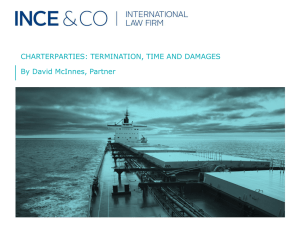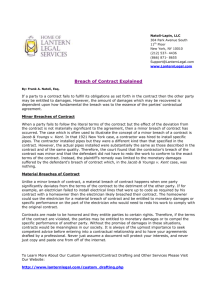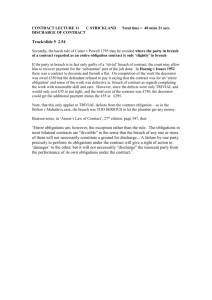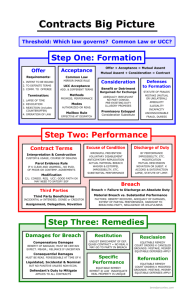Examiner's Comments March 2015 Contracts Question 1 This
advertisement
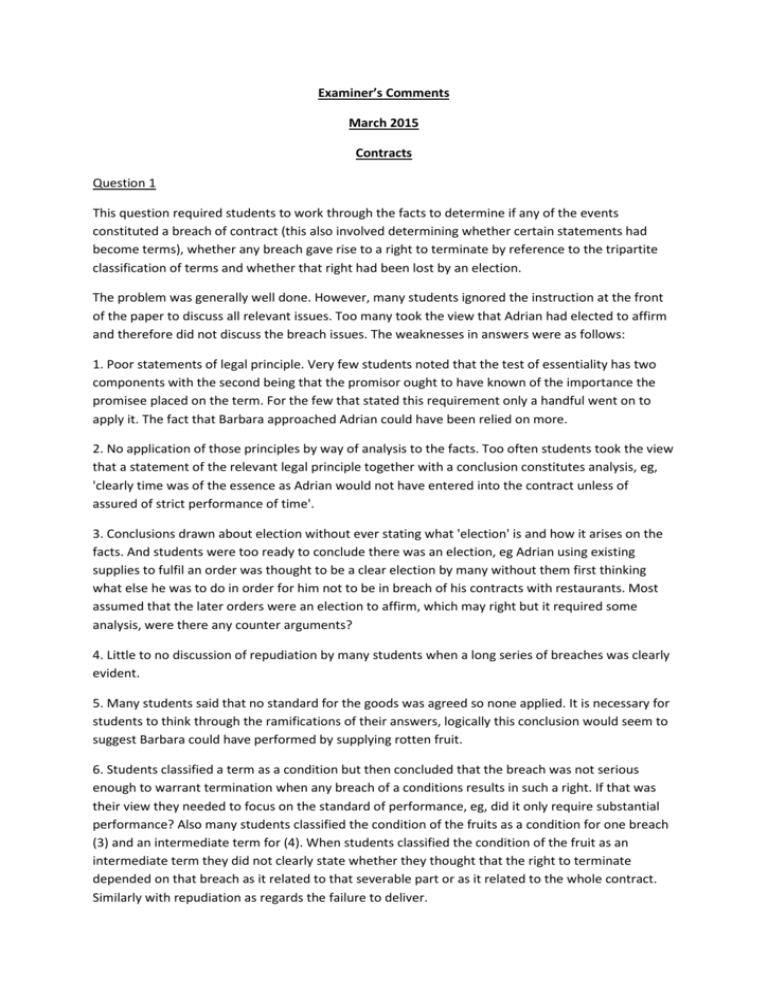
Examiner’s Comments March 2015 Contracts Question 1 This question required students to work through the facts to determine if any of the events constituted a breach of contract (this also involved determining whether certain statements had become terms), whether any breach gave rise to a right to terminate by reference to the tripartite classification of terms and whether that right had been lost by an election. The problem was generally well done. However, many students ignored the instruction at the front of the paper to discuss all relevant issues. Too many took the view that Adrian had elected to affirm and therefore did not discuss the breach issues. The weaknesses in answers were as follows: 1. Poor statements of legal principle. Very few students noted that the test of essentiality has two components with the second being that the promisor ought to have known of the importance the promisee placed on the term. For the few that stated this requirement only a handful went on to apply it. The fact that Barbara approached Adrian could have been relied on more. 2. No application of those principles by way of analysis to the facts. Too often students took the view that a statement of the relevant legal principle together with a conclusion constitutes analysis, eg, 'clearly time was of the essence as Adrian would not have entered into the contract unless of assured of strict performance of time'. 3. Conclusions drawn about election without ever stating what 'election' is and how it arises on the facts. And students were too ready to conclude there was an election, eg Adrian using existing supplies to fulfil an order was thought to be a clear election by many without them first thinking what else he was to do in order for him not to be in breach of his contracts with restaurants. Most assumed that the later orders were an election to affirm, which may right but it required some analysis, were there any counter arguments? 4. Little to no discussion of repudiation by many students when a long series of breaches was clearly evident. 5. Many students said that no standard for the goods was agreed so none applied. It is necessary for students to think through the ramifications of their answers, logically this conclusion would seem to suggest Barbara could have performed by supplying rotten fruit. 6. Students classified a term as a condition but then concluded that the breach was not serious enough to warrant termination when any breach of a conditions results in such a right. If that was their view they needed to focus on the standard of performance, eg, did it only require substantial performance? Also many students classified the condition of the fruits as a condition for one breach (3) and an intermediate term for (4). When students classified the condition of the fruit as an intermediate term they did not clearly state whether they thought that the right to terminate depended on that breach as it related to that severable part or as it related to the whole contract. Similarly with repudiation as regards the failure to deliver. Question 2 This was the most difficult question in the paper. The answer needed to discuss what might be the terms of the contract (and why - many discussed the statement about company scouts by reference to misrepresentation but did not then suggest what that meant for remedies; few considered the reference to 'guaranteeing' their presence as regards incorporation and classification according to Luna Park and how that might impact on the advice); whether there was a repudiation by Edgar and any election to terminate by #Brown. Whether #Brown was driven to terminate as performance required the cooperation of Edgar which was not provided, they essentially trespassed on his property to perform. Did this distinguish the facts of White & Carter Councils? Was #Brown's reply to the high school concert an election; and should they have accepted it as an act of mitigation. Was there a breach by Edgar prior to an election to terminate as his action appears an anticipatory breach, if no breach then what was the impact for damages and the activation of the liquidated damages clause? Was there another breach you could rely on. Was the $5000 liquidated damages clause a penalty, key issues were that it was payable for any breach but at the same time given that at the time of contract there was no way of working out the contract price as it was based on future ticket sales would it nevertheless pass the Dunlop test? Students were also asked to consider some heads of damages, eg, reliance, loss of chance and loss of enjoyment, these needed to be addressed by reference to causation and remoteness and any general principles relevant to these heads of damages. Generally statements of principle here were very poor and attempts to apply the principles of remoteness by reference to the cases in the course outline was not well done. Many, however, provided good statements about loss of chance and loss of enjoyment. But reliance loss was not as well done, especially its relationship to expectation damages, was this a case where it would have been difficult to assess expectation loss thus allowing for recovery of reliance loss, Amann? Question 3 This was a relatively easy question but overall poorly done. This question raised issues of incorporation of terms (principally by notice, reference and course of dealing), the construction of exclusion clauses, and the rights of third parties. Students seemed comfortable with discussing notice (Thornton) and course of dealing (DJ Hill, a few also raised Henry Kendall by way of contrast) but found difficulty in discussing the relationship between these when incorporation by reference was also thrown into the mix. However, very few made the point that incorporation by course of dealing is based on consent. Quite a few noticed that the heading over the terms of the exclusion clause in the head office seemed to refer to a different company (as if Fridge had used some other terms as a boilerplate). Even if one got over most hurdles would this of itself lead a client to confusion such that no sufficient notice was being given. The biggest problem with answers was not there was very few who really attempted to construe the clauses. Many could state the Darlington test but not take it any further. What was the natural meaning of this clause, was it relevant in construing 'howsoever caused' that negligence was expressly mentioned only in the limitation clause, did this narrow 'howsoever caused' in clause 7? Did clause 7 only protect Fridge and not Freezer? Was there any ambiguity to raise the contra preferentum rule? While Freezer was guilty of negligence was Fridge? Or had they breached a strict obligation to comply with an industry standard? Was the four corners rule relevant as regards Fridge relying on either clauses 7 or 8 in failing to comply with that standard? Too many described this as a rule of law rather than a rule of construction. Although a number saw that they had to discuss cases such as the Eurymedon in relation to Freezer, few worked methodically through those principles to draw a conclusion.

